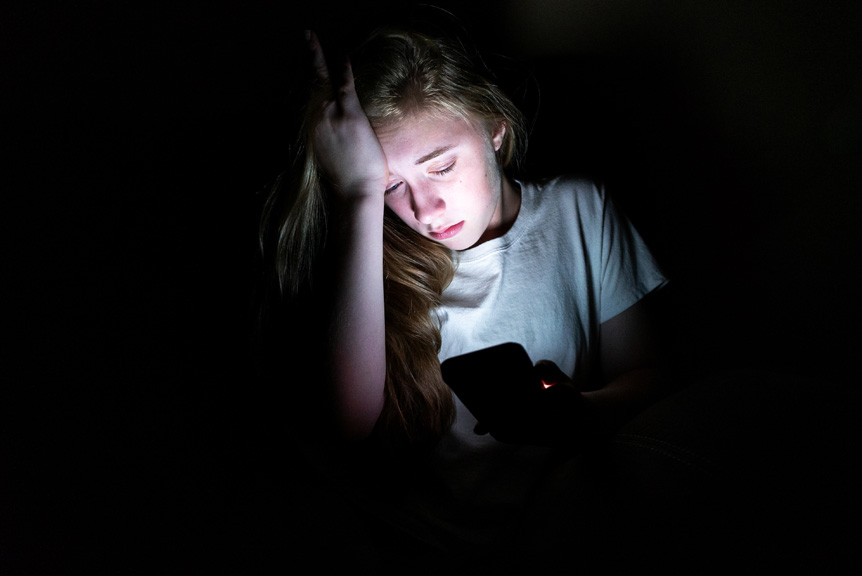- Behavior
- Parenting
- Safety
Trafficking is a risk to all children

In this article, you’ll find answers to questions like:
1. How can I protect my child?
2. What are signs of danger?
3. How to teach my child who to trust?
You’ve probably heard the shocking stories about sexual predators luring teens into human trafficking through social media and video games. It doesn’t matter the ethnicity, race, gender or economic level. Any teen can be vulnerable to the risk.
In Florida, prostitution or solicitation of a minor is considered sex trafficking. The average age that U.S. girls first fall victim is 12 to 15 while boys and transgender youth are 11 to 13, according to the U.S. Department of Health & Human Services.
Did you know sex trafficking doesn’t always involve travel? In fact, most victims are U.S. citizens or permanent residents. And our state ranked third in the nation for trafficking cases in recent years, according to the National Human Trafficking Hotline.
1. HOW CAN I PROTECT MY CHILD?
Parents and caregivers should talk to their children about sexual abuse and sex trafficking, says Nicole Bishop, division director of Palm Beach County Victim Services.
“Develop open communication,” she says. “Talk openly about the dangers of social media with practical tips, like never sharing personal information on the internet and never accepting friend requests from unknown people.”
Monitor your children’s social media accounts and who they hang out with, including the families of friends. “Notice if your child has new clothing, makeup, cell phones or other items, and ask how they got them,” Bishop says.
2. WHAT ARE SIGNS OF DANGER?
Today’s adolescents are better prepared than ever to discuss complex issues, but they may be less willing to open up, especially about sensitive topics like this. “Broach the subject anyway, knowing the information you share may keep your children safe,” Bishop says.
Empower your child to recognize the behavioral signs of other teens in danger that could include fear or paranoia, distrust of authority, responses that sound rehearsed or a controlling partner who speaks for them. Educate them to watch for physical signs that may include malnourishment, bruises, lacerations, burns and tattoos that say “Daddy,” “Property Of” or “For Sale.”
3. HOW TO TEACH MY CHILD WHO TO TRUST?
Many victims often share an early feeling of not belonging or feeling cared about in their families. One in five runaways reports being forced into sex trafficking, according to the Palm Beach County Human Trafficking Task Force. Female teens may romanticize predators.
Help children understand that a true friend is not someone you met yesterday and that a friend on TikTok (a social media app) is not a real relationship, Bishop says.
“If there is an adult that makes them ‘feel weird,’ encourage them to talk about it with you, and reinforce they should rely on their instincts,” she says.
You can reach the National Human Trafficking Hotline 24 hours a day by calling 888-373-7888, texting 233733 or chatting online here.
SOURCES:
• Nicole Bishop, division director, Palm Beach County Victim Services
• Palm Beach County Human Trafficking Task Force
• U.S. Department of Health & Human Services
• National Human Trafficking Hotline
You May Also Like
-
- Health
- Parenting
- Safety
Honesty is vital when talking to children about sexual abuse
While it may be an uncomfortable conversation, now's the time to talk to your children about sexual abuse. Local experts advise using a straightforward approach to empower children …
Read More -
- Other
- Parenting
- Safety
Help protect children from abuse
If you suspect a child is being abused or neglected, you are responsible to report it to the Florida Child Abuse Hotline at 1-800-962-2873, which is run by the state Department of …
Read More
Related resources
-
- Health
- Other
- Safety
Safe to Compete
A program of the National Center for Missing & Exploited Children that provides resources to protect child athletes from sexual abuse
Website Email -
- Other
- Safety
National Human Trafficking Hotline
A national hotline and resource center serving victims and survivors of human trafficking in the United States. The 24-hour hotline and live chat sessions are available in multiple languages. 888-373-7888 or text 233733.
888-373-7888 Website -
- Other
- Safety
Palm Beach County
Victim Services — help for victims of sexual assault, domestic violence and other violent crimes, including therapy and a crisis hotline
561-355-2418 or 24-hour crisis hotline at 866-891-7273 Website -
- Other
- Parenting
- Safety
National Center for Missing & Exploited Children
NetSmartz — interactive website that teaches kids and teens how to make safer choices online
800-843-5678 Website
